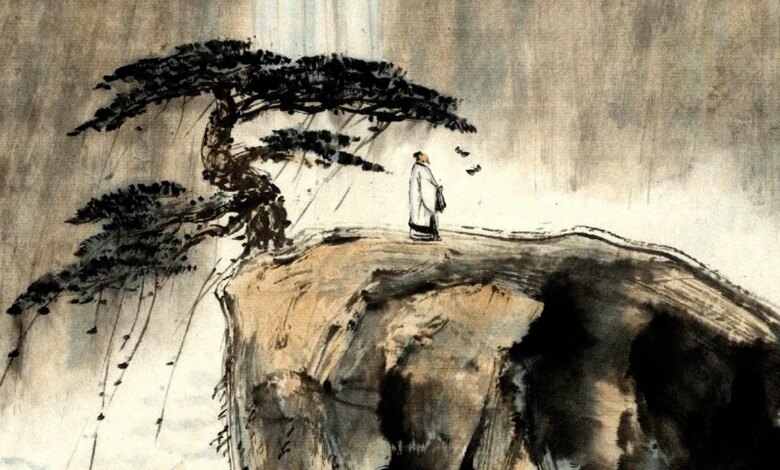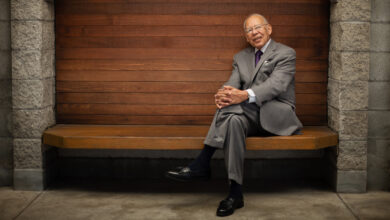This Is the Way: How the Dao Helps Chinese People Understand Chri…

In the opening lines of the Gospel of John, God’s eternal presence is rendered as “the Word,” a translation of the Greek word logos. In many translations of the Chinese Bible, including the popular Chinese Union Version, you will find this concept rendered as “the Dao (Tao).”
In English, Dao is commonly translated as “the Way.” In Chinese, the word (道) indicates a teaching or way of living that aligns with the heavens. It can also refer to the omnipresent essence of all creation in Daoism, a tradition of thought and religious practice that encourages its followers to seek immortality and achieve wisdom for discerning right responses to circumstances.
What does the Dao, or Word, of God have to do with the Dao of Daoism?
When I lived and taught in China, I encountered many sensitive hearts and inquisitive minds that were open to spiritual matters. Yet these seekers would often turn to the traditions of their ancestors for answers before considering the Christian gospel. My lack of familiarity with Chinese religion and philosophy hindered my witness, and so I decided to become a serious student of Confucian, Daoist, and Buddhist traditions.
Now, as a scholar of Chinese Christianity and religions, I have a much better sense of the ways that Chinese philosophy and religion can both converge with and diverge from Christian thought. I have a clearer sense of how people of Chinese descent connect their cultural heritage to their Christian faith.
Christian missionaries and scholars have a long-standing tradition of sincere dialogue with other religious and philosophical traditions. In Acts 17, Paul observes the inscription to an unknown God in Athens, Greece, and proclaims Christ as an expression and fulfillment of some of their traditions. Later, early church fathers like Origen and Augustine utilized Greco-Roman philosophies like Neoplatonism to deepen their understanding of the gospel and extend its reach across pagan Europe.
This pattern of using culture as a bridge for revealing the fullness of the gospel extends to China. Monks from the Assyrian Church of the East preached Christ in Chinese philosophical parlance during the Tang Dynasty in the 6th century. And Jesuit missionary Matteo Ricci adopted Confucian modes of thought and discourse to impress the imperial courts of the Ming Dynasty in the 16th century.
Alongside Confucianism, Daoism has shaped Chinese spirituality for centuries, and one of its greatest and most influential figures was the philosopher Zhuangzi.
Little is known about Zhuangzi besides the fact that he was a minor official in Meng (now Shangqiu), China, and was likely a contemporary of the Confucian scholar Mencius. Nevertheless, he is regarded as a famed Daoist thinker who rigorously rejected political power and social influence in favor of a life led by “free and easy” contemplation and simplicity.
In my view, a serious consideration of Zhuangzi’s teachings on the Dao are vital to understanding the gospel in and for Chinese culture. Zhuangzi is not a divine figure to be equated with Jesus Christ, nor are his teachings sacred like Scripture—but his sayings can be stepping stones for Chinese seekers to understand the New Testament and see Jesus as the Way, the Truth, and the Life.
How Buddhism spread across China
One of Zhuangzi’s most enduring ideas is what a “true person” (真人) looks like. To him, this is one who lives in perfect unity with the Dao and rightly discerns every situation. Zhuangzi characterizes this individual as exhibiting “inward holiness and outward kingship” (内圣外王), in that their spiritual power gives them a majesty unmatched by those who govern by force.
When the Han Dynasty disintegrated in A.D. 220, scholars felt disenchanted with Confucianism, as it failed to hold the kingdom together. They began a new intellectual movement known as neo-Daoism or “mysterious learning” (玄学), mixing Confucian and Daoist teachings that emphasized the importance of cultivating Zhuangzi’s concept of the true person.
Leaders of this new school of thought turned to Buddhist ideas to flesh out their neo-Daoist thinking. Buddhism entered China during the Han Dynasty but failed to grow because it taught that followers should renounce family and society in favor of monastic life, which was antithetical to Chinese sensibilities at the time.
Zhuangzi’s ideas made Buddhism more appealing to the Chinese elite. For instance, he encouraged his followers to practice “fasting of the heart and mind” (心斋), language that resonated with Buddhist meditation practices. In this way, Zhuangzi’s teachings served as a link between Daoism and Buddhism, allowing the latter to flourish across China.
If scholars once used Zhuangzi’s teachings to introduce Buddhist thought to Chinese culture, can Christians use Zhuangzi to do the same for our faith? How might Chinese seekers who are steeped in Daoist influences view Jesus according to this lens? To answer this question, I’d like to compare three of Zhuangzi’s most famous sayings with three New Testament passages.
Born of the Spirit
In Zhuangzi’s worldview, transformation occurs beyond human reason. One of his most famous teachings is from a dream in which he becomes a butterfly, leading him to question if he could potentially be the opposite: a butterfly dreaming that it is a man.
Through the butterfly dream, Zhuangzi implies that there may be much more to nature than we typically perceive. There are mysteries beyond our present reality that we cannot fully fathom. The dynamic experience of waking up from one reality into another suggests that a “higher” level of consciousness can come about without warning, absent of our own effort.
When speaking to a Chinese person whose worldview is influenced by Daoism, Zhuangzi’s perspective on the mystery of transformation may help them understand how becoming a believer is not a self-driven but Spirit-initiated endeavor.
As John 3 relays, Jesus talks with Nicodemus about eternal matters, saying, “No one can see the kingdom of God unless they are born again.” For Nicodemus, being “born again” seems illogical and impossible. But this birth is not one of body but of Spirit, Jesus responds.
The power of the Holy Spirit is far beyond that of the natural birth that Nicodemus was thinking about. The Spirit is like wind, blowing wherever it pleases (v. 8), and his work is not something we can manufacture by our own strength and intellect.
Cultivating spiritual fruit
To Zhuangzi, actions can become almost effortless when a person is connected to the Dao. In “The Secret to Caring for Life,” he writes about a master butcher who wields his knife instinctively. “After three years I no longer saw the whole ox,” the butcher says. “And now I go at it by Spirit and don’t look with my eyes. Perception and understanding have come to a stop, and Spirit moves where it wants.”
For Zhuangzi, what begins with effort slowly becomes as natural as breathing. The result is a seemingly supernatural capacity to do whatever it is one’s sense of vocation requires.
When introducing the gospel to Chinese seekers, Zhuangzi’s concept of effortless action (无为) may provide a deeper understanding of Paul’s teaching on the fruit of the Spirit in Galatians 5:22–25. We are to be rooted in the Spirit of God as opposed to the flesh, Paul writes, and since we live by the Spirit, we are to “keep in step” with the Spirit.
How do we contextualize this in the Chinese worldview?
Keeping in step with the Spirit refers to allowing the Holy Spirit to work in us daily as we abide in Christ and dwell on his Word. As we do so, there may be times in which displaying love, joy, peace, patience, and other fruit in our lives can become as effortless as Zhuangzi described, no matter how challenging our circumstances are.
Appraising worth
For Zhuangzi, seemingly insignificant things can be bearers of great worth. In a tale from “Free and Easy Wandering,” a critic complains about an ugly tree and compares it to Zhuangzi’s teachings: “Your words, too, are big and useless, and so everyone alike spurns them!”
“Why don’t you plant [the tree] in the Not-Even-Anything Village or the field of Broad-and-Boundless, relax and do nothing by its side, or lie down for a free and easy sleep under it? … If there’s no use for it, how can it come to grief or pain?” Zhuangzi responds wittily.
To Zhuangzi, the beauty of that “useless” tree is its natural capacity to stretch out and provide good in the world. He critiques humanity’s inclination to only attach value to things that are self-beneficial and asserts that there is inherent worth in all of creation.
When sharing about Christianity in Chinese culture, Zhuangzi’s story on finding worth in seemingly pointless items can serve as a springboard toward understanding Jesus’ description of the kingdom of God.
In the parable about the mustard seed in Matthew 13:31–32, Jesus compares the kingdom of heaven to a mustard seed which, when fully grown, becomes a great tree, “the largest of garden plants … so that the birds come and perch in its branches.”
To Jesus, the beauty of a tiny mustard seed is its ability to grow into a great tree that provides a home for the birds. Here, the mustard seed reflects how the kingdom of God may seem to have humble beginnings but is unstoppable in its growth.
Encountering the Dao become flesh
In examining Zhuangzi’s teachings and how they can help seekers in Chinese culture understand the Christian faith, we see instances of how his teachings can point toward Christ—one who is fully human and fully divine, and the fulfillment of Zhuangzi’s idea of the true person.
Jesus is himself the Way, or the Dao: “In the beginning was the Dao, and the Dao was with God, and the Dao was God. … The Dao became flesh and made his dwelling among us” (John 1:1, 14; CUV).
Nevertheless, bearing witness to Christ through the language and values of another worldview does more than just communicate the gospel to a different culture. It also provides new ways for understanding the gospel in our own culture. In this way, Zhuangzi’s sayings may also provide non-Chinese Christians with a new perspective on God’s Word, like how early Christian leaders used Greco-Roman philosophies to illustrate their theological articulations.
As Augustine said, and Aquinas later agreed, “all truth is God’s truth”—since, wherever truth is found, God is the source (John 16:13). And every signpost of God’s truth, embedded in any culture, points toward Jesus as the hope of all nations (Matt. 12:21).
Easten Law is the assistant director of academic programs at Princeton Theological Seminary’s Overseas Ministries Study Center.
Previous versions of this piece were published on ChinaSource.




